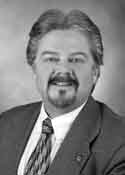 | Robb Rose is Director of Marketing Operations at Wesley Rehabilitation Hospital of Wichita. Robb is also a Respiratory Therapist, Boarded Disability Analyst and Adjunct Faculty for Wichita Sate University. He holds a Masters in Human Resources from Webster University. Robb serves on the American Lung Association Regional Council and the American Heart Association Board of Directors. Robb is married and has 2 children. He can be reached at (316) 729-9999 |
Health & Rehabilitation
2009-02-01 14:22:00
Music therapy
Question: I’ve noticed one of my friends who is healing from a traumatic injury respond to certain types of music, and seems to actually perk up some too. Is this for real?
Answer: Yes, it could be for real. In fact Music Therapy is for real, and is being used successfully at Inpatient Rehab Facilities. We have heard how Music can calm the savage beast within, well it’s pretty true. We’ve heard how different types of music can change the way we drive, or even help us go to sleep at night. Have you ever noticed the types of music at restaurants, shopping centers, and at places of work, and how it affects people?
Every therapeutic relationship revolves around trust and caring, and music is a shared opportunity. People can become very isolated when healing from major events such as; a stroke, head/brain injury, spinal cord injury, major traumas, worsening of Parkinson’s disease, etc.. Music in a group setting can have tremendous bonding effects. People not only respond to the music, but become more aware of each other through the music. Music has incredible ability to calm, animate, engage, and focus people. The power of music can actually outlast the music experience for hours and even long term.
Someone who has been struggling, confused, or even agitated can experience major turn around. Even intensive care units have documented evidence of the healing power of music for patients. Dr. Sacks, who is a well known neuroscientist and has written a book called “Musicophilia” states; “I would see people with Parkinson’s who couldn’t move a step or utter a syllable, but could dance or sing”. He also states; “You find some people with aphasia (inability to speak) who can’t utter a sentence in the normal way, but can sing a song with lyrics”. Music seems to sooth the brain; provide a rhythm, a flow, or reorganization for the brain.
When things don’t seem possible the regular way, the brain has the capacity to find a way to do it another way, and music can help this re-routing process. Different types of music will have different effects on the brain, and the healing process. The more melodic, and rhythmic the music, the better the healing process. Music seems to have the power to bring out almost every motion, mood, and state of mind. Even if you can’t carry a note like me, music is part of your memory, your appreciation, your understanding, and your very being. Music exists in every culture, and the people can communicate even when language is a barrier.


